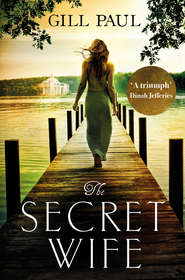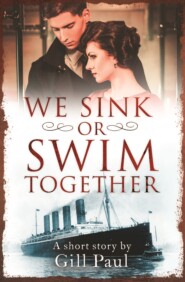По всем вопросам обращайтесь на: info@litportal.ru
(©) 2003-2024.
✖
Women and Children First: Bravery, love and fate: the untold story of the doomed Titanic
Настройки чтения
Размер шрифта
Высота строк
Поля
It was only afterwards he realised he’d forgotten to tell John about the fur coat, in some ways the strangest part of the scene he had witnessed. He made a mental note to mention it later.
Chapter Six
After breakfast Margaret Grayling found a deckchair on the promenade and sat staring out at the ocean with a huge lump in her throat, her eyes watering in the salt breeze. George, her husband, had been more than usually difficult during this voyage. He’d always been a cold man but his rudeness to her had previously been confined to their moments alone. He would never have spoken discourteously to her in front of the servants at their Madison Avenue home, yet he was prepared to do so in front of a steward on the Titanic, when all around them sat the cream of New York high society, no doubt listening in.
In private, George had renewed his demands that she should divorce him, but the idea was anathema to her. It was against every religious principle she held dear. They had been married in the sight of God and the minister had clearly said, ‘What God hath joined together, let no man cast asunder.’ How could she go against God’s commandment?
George didn’t share her religious beliefs and seemed to think she was merely worried about what society might say. In 1912, divorce caused a scandal and there was no question that both parties were stigmatised by it, even when one was blameless. But Margaret had never given much weight to the opinions of society. She didn’t engage in the complex sets of social rules that dictated the parties and dinners to which you were invited, the box in which you appeared at the opera, or which ladies left visiting cards at your door. She had more or less stopped appearing in society seven years earlier, after great tragedy had rent her life apart.
Theirs had never been a passionate marriage but it had produced a daughter, a gentle, artistic girl called Alice, who was the sun around which they both revolved and the cement that kept their marriage civil and sometimes even happy throughout the seventeen years of her life. When Alice died of scarlet fever in February 1905, everything had collapsed inwards. In the cruellest of all the cruel things George had ever hurled at her, he screamed that it was her fault, that she had been responsible for killing their daughter, and from that fatal wound their marriage had never recovered.
Rationally, Margaret knew it was simply not true. She and Alice had visited friends of hers and two days after the visit, it transpired that one of the friends had succumbed to scarlet fever, despite showing no signs of it when they were there. And then Alice developed a sore throat and pink cheeks and a sand-papery rash on her chest and neck. Her friend recovered within a week but Alice’s condition had continued to deteriorate. She struggled for breath and was rarely fully conscious during her last days. George paid for the advice of every specialist in New York and beyond, throwing money at the problem, but to no avail. In the small hours of the night, Alice’s breathing became fainter and fainter, then stopped altogether.
A solitary tear trickled down Margaret’s cheek. Grief like that never left you. It abated sometimes, just for a while, then returned to thump you in the gut and knock you backwards when you least expected it. It was something she would always live with. But George turned all his grief into anger directed towards his wife. All the intimacy of their marriage, such as there had been, mutated into cold silence or bitter recrimination. She missed the days when they used to be a team, lying in bed together discussing Alice’s small triumphs. She missed the occasional gesture of physical affection. Even a simple peck on the cheek would mean so much now but there was no chance of that. Never again.
She’d hoped this trip to Europe could achieve some kind of rapprochement. She’d begged him to bring her along, hoping that the unfamiliar surroundings might re-ignite some companionship at least, but to no avail. He had left her on her own for several weeks in a hotel in Bologna, claiming that he had business to conduct, then insisted on cutting short the vacation and rushing to catch Titanic’s maiden voyage. Nothing had been gained by the trip. They were returning to the aching loneliness of the mansion where they lived separate lives under the same roof.
Should she go against God’s will and give George his divorce so that each had a chance of happiness in the future? The more she observed other marriages, the more she believed that women seemed most content who lived on their own.
There was a Canadian couple in the dining saloon, the Howsons, who were a terrible advertisement for the institution. Married less than a year, they were already disappointed in each other. Neither had fulfilled the other’s expectations. Margaret knew them slightly and could see where the fault lines lay. She hated that he gambled or, more particularly, that he gambled and lost. He hated the money she spent on clothes and fripperies. He’d been a bachelor throughout his twenties and had never realised quite how much a new gown cost, nor how many were required to see a fashionable woman through the season. On the Titanic, first-class women would never dare turn up to dinner in a gown they had worn before. Each evening required a lavish new creation.
There was something more, Margaret mused. They had moved to New York after their marriage and he had hoped to gain immediate acceptance in high society through his wife, who came from a better family. He had no concept that to reach the inner circle of the kind of high-society grandees travelling on the ship would take careful calculation and manoeuvring over at least a year, and even then they might never get there since he worked in property. Being Canadian stood against them as well. They might be endured for the course of the voyage but no new invitations would be delivered to their butler on their return.
Margaret could view all this from a distance and see the futility of their ambitions and desires in the context of a life. So many other things were more important, but the young could never understand that. To them social position was everything, since a wag had said back in the 1880s that there were only four hundred fashionable people in New York (the exact number that would fit in Mrs William Astor’s ballroom). The term ‘The Four Hundred’ had been coined and instantly everyone began scrabbling for their place in the hallowed ranks. The irony was that the harder you tried, the less eligible you appeared, and she knew the Howsons would never get there. Would that prove a rupture that would tear their marriage apart?
Mrs Howson’s flirtatiousness with Reg was awkward for the boy. He dealt with it professionally, but it couldn’t be easy when you are trained to be polite to all passengers. You can’t take sides between husband and wife.
She wondered if marriage would be easier when you came from Reg’s class. Surely things would be simpler without all the rules about status that bedevilled her own class? His girl, Florence, sounded like a sweetheart, but Reg had intimated that he was hesitating about taking the step of getting engaged. Maybe it was hardly surprising given all the bickering couples he saw on the ships where he worked. He didn’t want to make a mistake. He was a good person, and wouldn’t have led her on for – what was it? – two years now if he didn’t genuinely love her.
Margaret had taken a liking to Reg. He had the looks of a moving picture star but seemed unaware of it. There was no trace of the vanity that afflicted many handsome men she had met, who checked their appearance in every reflective surface and strutted arrogantly into rooms, watching for a reaction. Reg seemed modest and introspective, and an all-round good sort.
During the Mediterranean voyage, she had witnessed an incident that he didn’t know she had seen. His friend John had been looking very queasy during breakfast service one morning, as if he had a stomach upset, and he had suddenly rushed off, leaving a pile of soiled plates on a table near the entrance, where arriving guests would see them. The chief steward noticed them and became instantly enraged. His eyes swept the room looking for someone to blame, and in an instant Reg was by his side. Margaret was close enough to overhear their exchange.
‘I’m sorry, sir, I only put them down for a moment. It won’t happen again,’ Reg said, and relayed them quickly to the pantry, letting John off the hook.
That’s one of the reasons he was Margaret’s favourite steward, but she also liked a sense that he had hidden depths. He was a sensitive person, who thought about the world and all that he saw of it. When they talked, he really looked at her and seemed to see beneath the surface.
There was something else, as well. Reg was an independent type. Deep down, despite his bosom friendship with John, she sensed a loneliness in him, and that’s what attracted her. They were alike in that, for she was herself perhaps the loneliest woman in the world.
Chapter Seven
At luncheon, first-class passengers could choose from a set menu with soup, fish, chicken, eggs or beef; they could have items from the grill, such as mutton chops or sirloin steak; or they could select from a buffet with salad, cold cuts and seafood dishes, such as salmon mayonnaise, Norwegian anchovies or potted shrimp. Reg hovered near the buffet to help serve passengers when they’d made their decision, or to retrieve the food they dropped while serving themselves.
Most of the ladies had changed since breakfast. First thing in the morning they wore skirts and blouses but for lunch they wore suits with long jackets – some of them caught at the back like a bustle, others slim and fitting on the hips – and all topped with the obligatory hat. Personally, Reg thought it was silly wearing a hat to eat a meal because they kept having to flick back those long floaty feathers and ribbons to stop them dipping in the food.
The Howsons sat down at their table and Reg spread the napkin on Mrs Howson’s lap in a swift fluttering motion, without touching her or encroaching on her line of sight, just as he’d been taught. Straight away she began bothering him with her dozens of inane questions.
‘Have you ever been skiing, Reg? You’d love it. You should visit Calgary some time and we’ll take you out on the slopes.’
‘Thank you, ma’am, but my work keeps me too busy.’
‘You’ve got such a good figure, you must play some sports. What do you play, Reg?’
‘I like a bit of football when I’m back home.’
‘What in God’s name is football?’
‘It’s a game with two teams where you kick a ball into a goal, ma’am.’
The husband sat scowling throughout their exchange; then as soon as Reg left the table, he heard the hiss of their argument.
‘It’s vulgar to talk to the staff like that. You shouldn’t be overfamiliar. Didn’t your mother teach you anything?’
‘You’re such a snob.’
‘You’re so common.’
The tension grew as they ate, and Reg tried to keep himself well clear of them. When he came to collect their plates, Mrs Howson’s face was pink with fury.
‘My husband thinks I shouldn’t fraternise with you, Reg. What do you think?’
‘Oh shut up,’ her husband snapped. ‘Leave the poor boy alone.’
Reg was balancing their plates and a serving dish on one arm as he scooped a stray piece of cauliflower from the tablecloth. Mrs Howson turned and yanked the pocket of his jacket just at a moment when he was twisted at an awkward angle, leaning sideways towards the table.
‘I’ll talk to him if I feel like it,’ he heard her saying as he struggled to regain his balance, but it was no use. He managed to twirl at the last moment so that the dishes fell to the floor behind rather than into her lap, but the dining salon fell silent at the resounding crash of breaking crockery. It echoed round the Jacobean carved ceiling then died away to an expectant silence.
Instantly Reg spun into action, crouching down and picking up the jagged pieces in his hands. John appeared by his side with a dustpan and brush and between them they had the floor spotless again in less than a minute. But the chief steward, old Latimer, was watching and as Reg scurried past, he said in a cold voice, ‘Wait behind after service.’
Reg was glad to see that the Howsons had left when he emerged from the galley. Mr Grayling had gone as well, but Mrs Grayling sat alone at their table, so he approached to ask if he could fetch anything for her.
‘I saw what happened with those plates,’ she told him. ‘It wasn’t your fault. Will you get into trouble?’
‘Please don’t worry on my behalf, ma’am.’
‘I could explain to the chief steward what I saw, if that would help.’
‘Thank you,’ Reg said. ‘But I simply lost my balance. I’m sorry if the noise disturbed you.’
She looked at him with her kind eyes. ‘They’ll make you pay for the breakages out of your salary, won’t they? I know how these liners operate. And I’m sure this porcelain is expensive. Please will you at least let me give you the money?’
‘We’re not supposed to accept money from passengers, but thank you very much for the offer.’ For a moment, he felt like crying under her maternal gaze. She was much nicer than his own mum, who’d never had any time for him. She couldn’t wait to send him out to work so he could contribute to the household coffers, which seemed to be his only value to her.
‘Nonsense. Plenty of the other staff members accept tips, and you will accept one from me. I insist. I will slip it to you quietly, when no one else is looking, some time before we reach New York, but for now I don’t want to hear any more about it.’ She stood up to bring an end to the conversation. ‘I’ll see you at dinner.’
‘Thank you, ma’am.’ Reg pulled back her chair for her, wrestling with a powerful wave of embarrassment mixed with gratitude.
He would accept the money, he decided, after Old Latimer told him that the three porcelain plates he had broken cost two and six each. Reg’s wages were only two shillings and four-pence per day, so that breakage would cost him more than three days’ wages – in other words half of what he would make on that crossing.









